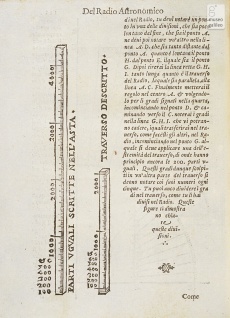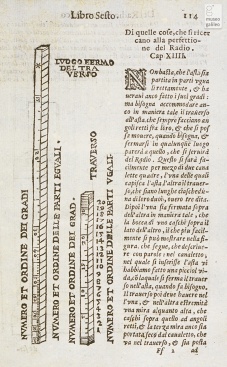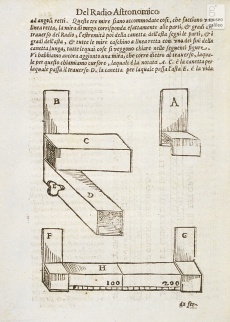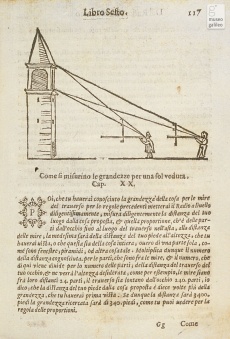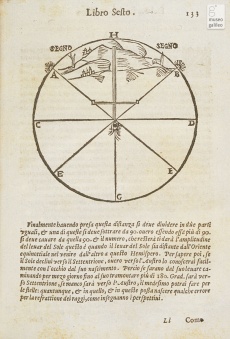Radius Astronomicus
From Inventions
m (moved Radius astronomicus to Radius Astronomicus) |
Current revision as of 10:58, 27 July 2010
Name commonly used since the fifteenth century (in Latin, radius astronomicus) to indicate the astronomical variant of the more common cross-staff.
Contents |
Inventor
Pietro Apiano
Historic Period
1545
Description
Instrument for astronomical and terrestrial measurements. Variant of the cross-staff or Jacob's staff developed by Pietro Apiano (1533, Introductio geographica) and described later by Reiner Gemma Frisius (1545). The main staff could be either 2 or 4 cubits long (approx. 90 or 180 cm) and was divided into 4200 parts. The cross-staff, which could also slide laterally in a guide, was half this length and was divided into 2100 parts. On one side of each staff (having a square section of approx. 2 cm per side) was the division into degrees used to measure angles. Gemma Frisius describes in detail its topographical applications but in Chapter XIII he also mentions its use in perspective drawing: "Nonetheless, I will not discuss how some painter, standing at an elevated position, can portray by means of the optical principles a fortress or a church or a city (if he so desires) with the aid of our radius. This is an operation that can be deducted by any intelligent person both from what has been said, and from what will be said later. I must mention, however the great ease and advantage that some architect or painter can find in our instrument if... he desires to represent graphically in a painting the entire façade of a building standing before him, in accordance with the symmetry of its parts".
Bibliographical Resources
Apianus, Petrus. Introductio geographica Petri Apiani in doctissimas Verneri annotationes, continens plenum intellectum et iudicium operationis, quae per sinus et chordas in geographia confici potest, ... huic accedit translatio nova primi libri Cl. Ptolemaei ... authore Vernero ... una cum opusculo Amirucii Constantinopolitani ... adiuncta est et epistola Ioannis de Regiomonte ad ... D. Bessarionem ... . Ingolstadii, 1533.
Gemma Frisius, Reinerus. De radio astronomico et geometrico liber: in quo multa quae ad geographiam, opticam, geometriam et astronomiam utiliss. sunt demonstrantur. Antverpiae, apud Gregorium Bontiu, 1545.
Images
Author of the entry: Filippo Camerota
